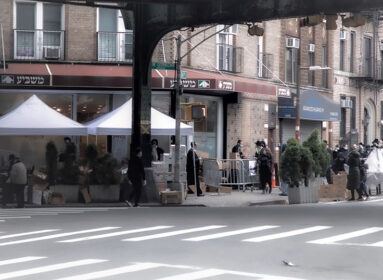
By Cindy Mindell
SIMSBURY – After 36 years as the first full-time spiritual leader of Farmington Valley Jewish Congregation-Emek Shalom (FVJC) in Simsbury, Rabbi Howard S. Herman will retire in June 2016.
Born and raised in Bridgeport, Herman was active at Congregation Rodeph Sholom and inspired by his experiences there.
“Cantor David Leon and Rabbis Harry Nelson and then Sanford Hahn had a direct impact on my life,” he says. “They were friends to all of my friends. We did all kinds of things together: we went to baseball games, we went to Broadway shows, we had picnics on the beach. I grew up knowing I wanted to do things like that with kids. They were mentors in every way. They didn’t push Jewish ritual; they pushed Jewish living as a way of life. That really resonated with me.”
As an undergraduate, Herman majored in religion with a concentration in Judaic studies, attending Bradley University in Illinois and Tel Aviv University. All told, he spent five years in Israel, also studying in Jerusalem at Yeshivat HaKotel, the Hartman Institute, and Hebrew Union College-Jewish Institute of Religion (HUC-JIR). He was ordained in 1978 at HUC-JIR in Manhattan.
After serving as assistant rabbi at Old York Road Temple-Beth Am in Abington, Pa. for two years, Herman was appointed the first rabbi of Farmington Valley Jewish Congregation-Emek Shalom and settled with his family in West Simsbury.
While he is retiring from the pulpit, Herman intends to continue in his other roles. He serves as the Jewish chaplain at the Veterans Affairs healthcare facilities in Newington and West Haven, as an adjunct professor of philosophy and ethics in the Connecticut State Colleges and Universities network, and as host of the WTIC-AM 1080 Sunday-morning show, “Reflections.” He is also a member of the Simsbury Juvenile Review Board and is active in numerous clergy organizations throughout Connecticut.
Herman has most enjoyed two particular aspects of his rabbinic career: “Working directly with people of all ages, being in the position to influence them Judaicly and getting to know them beyond just the surface,” he says. “I enjoyed the variety of things that I was able to do on an ongoing basis. I was able to teach, counsel, preach, and work with very young kids and with seniors.”
Given that the average tenure for clergy across all religious denominations is six to eight years, Herman says that his 36-year stint with FVJC is “long beyond the norm… and good years for both myself and the temple.” Now, there are other things Herman would like to pursue while he is still able, though his next avocation is not yet clear.
“I love my academic work and I am very involved in chaplaincy with the VA, so possibly something in those realms,” he says. “I have also been thinking of moving into something completely different outside of the Jewish world. I want to get involved in some social-action work in a more direct way.” Herman also looks forward to spending more time with his family – his wife Monday, and his three children and three grandchildren.
When Herman arrived for his first interview 36 years ago, the Simsbury Reform congregation numbered some 100 families, many of them original founders of the temple. He has watched the congregation evolve to become both more inclusive and more involved in the community at large. FVJC has more than doubled its membership, including interfaith and LGBT families.
“Today, we are a congregation who is open, diverse, affirming, spiritual, and committed to doing good work out in the community,” Herman says. “We are a congregation who is part of the Big Tent Judaism initiative and who warmly welcomes anyone who wishes to participate in our endeavors. We are an Israel-centered congregation who loves to learn and loves to involve families and individuals of all ages who want to connect with a larger community.”
With this kind of foundation in place, Herman is confident that the time is right for his departure.
“I think the congregation is solid and strong and has a great presence in the Greater Hartford area,” he says. “I believe it will do quite well with the next generation of leadership.”
Congregational president, Paula Schwartz, points to the many ways in which Herman expanded the temple’s offerings.
“Rabbi Herman has brought many innovative programs to the congregation in his years with the community,” she says. “His weekly study group brings members and non-members from throughout the area to discuss and learn about Jewish history, ethics, and spiritual matters. Many people have listened to his programs on radio. He has introduced programs and services, including a monthly Kabbalat Shabbat service, scholar-in-residence weekends, a Yom Kippur discussion group, Shabbat Across America, adult bar/bat mitzvahs, and biennial congregational trips to Israel. Rabbi Herman has also presided over numerous life events for so many of us and provided valuable spiritual guidance when we needed it the most.”
Herman hopes that what he has worked to instill in the congregation will remain intact after his departure.
“I have consistently stressed inclusion, family, Jewish values, and having the temple feel like being at home,” he says. “It is that homey feeling that, I believe, helps insure success. I am hoping that everyone who crosses the temple portals will buy into that philosophy. I also stress that Judaism is joyous and that when one immerses oneself in the Jewish world, one does so with joy – which then inspires people to continue being involved. I also have given the temple a sense of spirituality and encouraged congregants to search for personal spirituality both at the temple and in Jewish life. I hope that the temple will encourage people to search for and find a spiritual place that makes sense to them and fulfills them.”
According to Schwartz, the Board and congregation will soon begin the search for a new spiritual leader, and Herman plans to work with them in the transition process.
CAP: Rabbi Howard Herman









 Southern New England Jewish Ledger
Southern New England Jewish Ledger














